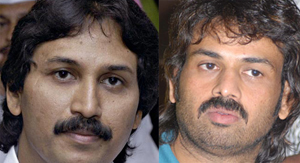Bengaluru, Feb 21: Former Minister Kumar Bangarappa appears poised to shift loyalties from the Congress to the Bharatiya Janata Party, as he is “frustrated with the ill-treatment” meted out to him in the ruling party. He has, however, said that he is yet to take a final call.
 In the event of Mr. Kumar joining the BJP, it will again be a straight fight between his brother — Madhu Bangarappa (JD-S) and him — in Sorab constituency in 2018, once represented by their late father and former Chief Minister S. Bangarappa. H. Halappa, who contested on the KJP ticket in 2013, and is now in the BJP, is expected to migrate to another constituency in the district to make way for Mr. Kumar.
In the event of Mr. Kumar joining the BJP, it will again be a straight fight between his brother — Madhu Bangarappa (JD-S) and him — in Sorab constituency in 2018, once represented by their late father and former Chief Minister S. Bangarappa. H. Halappa, who contested on the KJP ticket in 2013, and is now in the BJP, is expected to migrate to another constituency in the district to make way for Mr. Kumar.
While Mr. Kumar may be the latest to join the bandwagon, it is speculated that at least half a dozen other Congress leaders will follow in the footsteps of former Chief Minister S.M. Krishna and senior leader V. Srinivas Prasad, who moved out of the Congress recently. Leaders like M.H. Ambareesh, Suresh Gowda, and L.R. Shivarame Gowda, leaders from Mandya, are likely to quit the Congress, sources in the party said.
Like his late father, who used to convene a meeting of his supporters in Sorab town prior to taking important political decisions, Mr. Kumar convened one recently. “In the Sorab meeting, people forced me to join the BJP. I will take a final call after holding another round of consultations with my supporters in Sorab,” he said.
Lashing out at Revenue Minister Kagodu Thimmappa, he said JD(S) activists were nominated for the taluk-level bagair hukum regularisation committee in Sorab constituency, which is represented by his younger brother, Madhu Bangarappa (JD-S).
Mr. Kumar said there was deep discontent among Congress activists against the style of functioning of the government and the Karnataka Pradesh Congress Committee. “The KPCC has remained deaf even to the displeasure expressed by senior leaders C.K. Jaffer Sharief, B. Janardhana Poojary, and H. Vishwanath,” he said.
Meanwhile, Madhu Bangarappa, president of the state youth wing of the JD(S), ruled out the possibility of his brother Kumar Bangarappa joining the party. “He is in a national party; I am a member of a regional one. We cannot be in the same party. That being the case, there is no possibility of him joining the JD(S),” Madhu told reporters in Shivamogga.






Comments
Both these are ruining their future. Its unfortunate that few leaders wants to be in higher position always for their own benefit and they start blaming the party whenever they are not given chance. These are selfish parties who are caring of themselves only and not caring for party or public. These people are now joining the most corrupt party BJP.
Dear Brothers,
Both are same blood belongs to ONE family let them stay together and allow them to lead a peaceful and happy life.
why the politicians are playing such dirty politics with innocents.
One Shakuni is playing a big game behind the screen is a well known news.
Add new comment